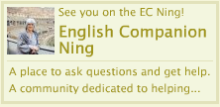The viral video that came through my e-mail last week had nothing to do with cats. Instead, this video showed the singer and actress Kristen Chenoweth sharing a duet with an audience member. Apparently, this opportunity is extended to concert goers on a regular basis by Chenoweth who invites a member of the audience to sing the Elphaba role in the duet, “For Good” from the musical Wicked (Music and Lyrics by Stephen Schwartz; based on the book Wicked by Gregory Maguire).
On this particular night, the selected audience member was Sarah Horn, a voice teacher, who as fate would have it was wearing a green shirt and a floor length green skirt with straight hair and black rimmed glasses. Horn noted in her recollection of being chosen, “How much more Elphaba-looking can a regular gal get?”
Horn strode across the stage of the Hollywood Bowl; she towered over the petite Chenoweth and, with the glee of a child opening the best present ever, proclaimed to delight of the crowd, “I’m on stage with Kristen Chenoweth!”
The music began with Chenoweth firmly in control. “I’m Glinda,” she said, and began singing her duet’s part:
I’ve heard it said
That people come into our lives for a reason
Bringing something we must learn
And we are led
To those who help us most to grow
If we let them
And we help them in return
Well, I don’t know if I believe that’s true
But I know I’m who I am today
Because I knew you…
There was a pause in the music, and Chenoweth put up her hand to indicate she had one more verse to sing. “Still me,” she said. The crowd giggled, and she completed her verse:
Like a comet pulled from orbit
As it passes a sun
Like a stream that meets a boulder
Halfway through the wood
Who can say if I’ve been changed for the better?
But because I knew you
I have been changed for good
Then Chenoweth stepped back. Sarah Horn stepped in, and the song took off when Horn’s clear voice began:
It well may be
That we will never meet again
In this lifetime
So let me say before we part
So much of me
Is made from what I learned from you
You’ll be with me
Like a handprint on my heart
And now whatever way our stories end
I know you have re-written mine
By being my friend…
There was an immediate response from the crowd; Horn was amazing! The conductor of the Los Angeles Philharmonic Orchestra stopped to turn around (twice) to see who was singing. One imagines him thinking, Is this a plant?
But the best reaction comes from Chenoweth, whose delight at having so capable a voice to sing this duet with is clearly visible to the viewer.
That moment is captured on a handheld camera, but what makes the recording is so powerful is that it captures the moment of risk. The ever-gracious Chenoweth is practiced in taking this risk. There are many videos on YouTube that place her onstage in other concert venues with an audience member singing “For Good.” These recordings capture her saying “Still me…” at the musical pause at the end of the first verse; she knows how to coach the selected partner when to begin. The moment a new Elphaba opens her mouth, Chenoweth wants to make sure she enters on the right musical cue.
Sarah Horn hit that musical cue entrance, and every other musical note after that, to the delight of the crowd and to Chenoweth. She accepted the challenge that Chenoweth offered and took a risk. Chenoweth’s enthusiasm was matched in the power of their duet and the praise she heaped on Horn at the end.
The word risk has a dark side; according to the Merriam Webster Online Dictionary, risk means: “the possibility that something bad or unpleasant (such as an injury or a loss) will happen.” There was certainly the great possibility that Sarah Horn might have failed; her reputation as a voice coach was out for judgment. That great risk, however, was matched with great reward. To date the video has just about 3 million hits, and Horn had her experience published on the Broadway World blog.
The same can be said for those teachers and coaches that offer their students the opportunity to take a risk. The lyrics of “For Good” reflect the ideals of education where “we must learn”; where “we are led” in order “to grow.” In schools, teachers and coaches empower students to risk being noticed on a variety of stages: the classroom, the auditorium, the athletic fields, etc. They practice to prepare the student to take a risk. They encourage their students to risk what may be the criticism of others. They signal the student to “the cue” that starts the risk, and they may have the opportunity to delight in watching the student succeed.
Teachers and coaches who support students know that a school environment is protected space, and that failure in the protective space of a school provides an ideal space to practice risk. Yet there are moments when the teacher or the coach, like Chenoweth on the video, must step back for the student step to forward into “the the possibility of danger”.
Risk empowers students. Risk changes students. Risk prepares students for real life. Teachers and coaches who allow students the opportunity for risk are like those “Glindas” to their student “Elphabas” in a different kind of duet, but a duet with the same message as the lyrics of the song:
(Glinda):
And because I knew you…
(Elphaba):
Because I knew you…
(Both):
Because I knew you…
I have been changed for good…





